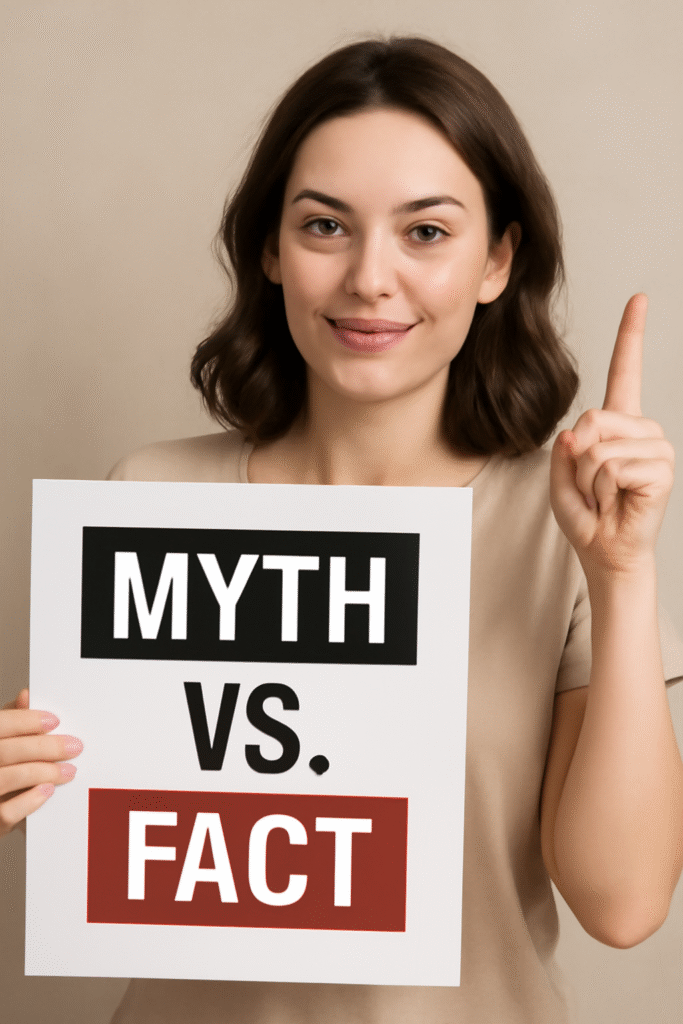Say goodbye to beauty myths that are holding you back from glowing skin and hair. It’s time for the truth!”
Introduction
When it comes to beauty, there’s no shortage of advice, tips, and myths circulating on social media, blogs, and even from well-meaning friends. But not everything you hear about beauty is true! In fact, some common beauty myths could actually be harming your skin, hair, and overall health.
In this blog, we’ll dive into the most popular beauty myths and explain why they’re misconceptions. Plus, we’ll provide you with the facts and science-backed advice you need to take better care of yourself. Let’s bust these beauty myths once and for all!
Myth 1: “You Need to Wash Your Face with Soap for Clean Skin”
Fact: While soap might be effective for cleaning your hands or body, it’s not the best choice for your face. Soap is typically too harsh and can strip your skin of its natural oils, leading to dryness and irritation. Instead, opt for a gentle, pH-balanced facial cleanser designed for your skin type. Whether you have oily, dry, or sensitive skin, there are many options available that will cleanse your skin without causing damage.
Myth 2: “More Product = Better Results”
Fact: When it comes to skincare and haircare, more isn’t always better. Using too much product can clog pores, lead to product buildup, or cause irritation. The key is to use the right amount of product for your skin and hair type. Less is often more! Stick to a simple routine with quality products and apply them sparingly.
Myth 3: “Sunscreen Is Only for Summer”
Fact: Sunscreen is a must year-round, even on cloudy days! UV rays can damage your skin during all seasons, so protecting your skin from harmful rays is essential, no matter the time of year. Make it a habit to apply sunscreen every day—whether you’re inside or outside—to reduce the risk of premature aging and skin cancer.
Myth 4: “Drinking Lots of Water Will Cure Dry Skin”
Fact: While staying hydrated is important for your overall health, drinking excessive amounts of water won’t necessarily cure dry skin. Dry skin is often caused by environmental factors, like cold weather or hot showers, which can strip moisture from the skin. The best way to tackle dry skin is to use a hydrating moisturizer that locks in moisture and creates a protective barrier. Don’t rely on water alone to solve the issue.
Myth 5: “You Should Never Pop Pimples”
Fact: This myth is only partially true. Popping pimples can be harmful, but not all blemishes are the same. If you have a cystic pimple (a painful, deep pimple), popping it can cause more harm than good by pushing bacteria deeper into the skin, leading to more inflammation and scarring. However, whiteheads and blackheads can often be safely extracted with the help of a professional dermatologist or esthetician. The key is to be gentle and avoid squeezing too hard.
Myth 6: “Expensive Products Are Always Better”
Fact: Price doesn’t always equate to quality when it comes to beauty products. While luxury brands may offer premium ingredients, many drugstore products are just as effective and safe for your skin. Instead of focusing on the price tag, look for products that suit your skin’s specific needs. Ingredients such as hyaluronic acid, retinol, and vitamin C can be found in both high-end and drugstore products.
Myth 7: “Shaving Makes Your Hair Grow Back Thicker”
Fact: Shaving does not cause hair to grow back thicker. This myth is likely due to the blunt tip left at the base of the hair shaft after shaving, which can feel coarser as it grows back. However, shaving has no effect on the hair’s growth rate or texture. If you’re concerned about hair growth, try different methods like waxing or laser treatments.
Myth 8: “Natural Products Are Always Safer”
Fact: While natural products may seem like a safer option, they can sometimes be just as irritating or harmful as synthetic products. For example, some essential oils can cause allergic reactions or skin irritation, even though they are natural. Always check the ingredients list and patch-test new products, whether they’re natural or not.
Myth 9: “Anti-Aging Products Are Only for Older People”
Fact: Anti-aging products can benefit anyone, no matter their age. The earlier you start incorporating anti-aging ingredients like retinol, peptides, and antioxidants into your routine, the better. These products help protect the skin from damage and boost collagen production, which helps maintain a youthful appearance.
Myth 10: “You Can’t Change Your Skin Type”
Fact: While your skin type is largely determined by genetics, external factors like your environment, diet, and skincare routine can influence it. If you’ve always had dry skin but now notice it’s more oily, your skincare routine may need to be adjusted. Similarly, if your skin is prone to acne, a change in diet or products might help. Skin is dynamic, so it’s worth paying attention to its changing needs.
Conclusion
Beauty myths are easy to believe, especially with the pressure to follow trends and advice from influencers. However, debunking these common misconceptions will help you take better care of your skin, hair, and overall health. Remember, beauty is about finding what works for you, and sticking to science-backed, gentle routines is the key to long-term success.
Disclaimer: This blog is intended for informational and educational purposes only. The views expressed are personal opinions or general insights, not professional or legal advice. Readers should do their own research or consult relevant professionals before taking action based on this content.
#BeautyMyths #SkinCare #HairCare #Carrerbook #Anslation #BeautyTips #BeautyHacks #DebunkingMyths #SelfCare #BeautyRoutine #SkinCareTips #BeautyCommunity #HealthySkin #NaturalBeauty #BeautyExperts

